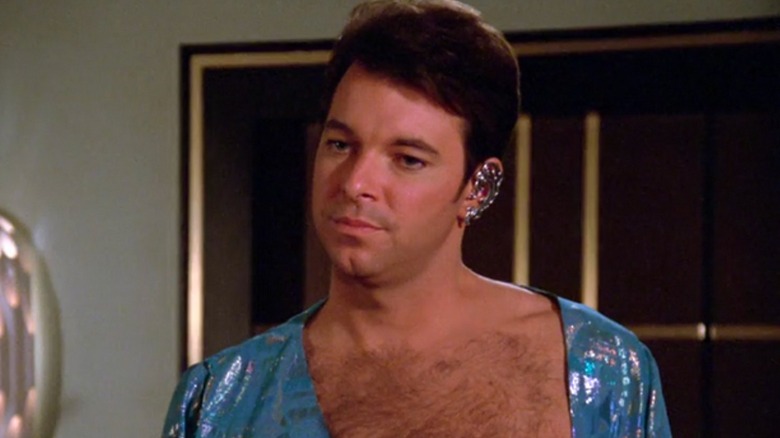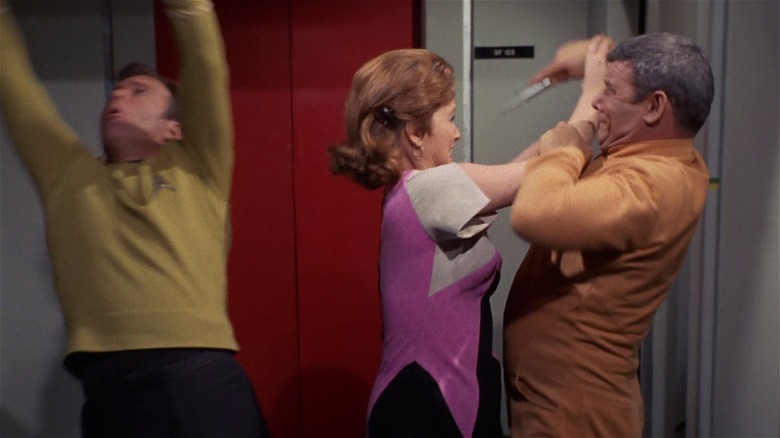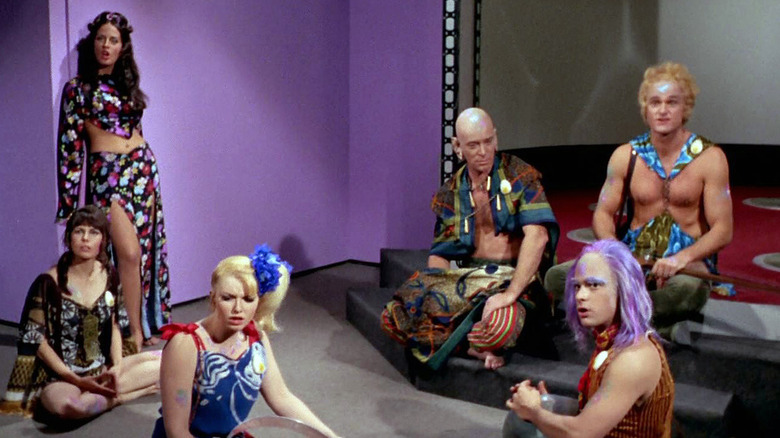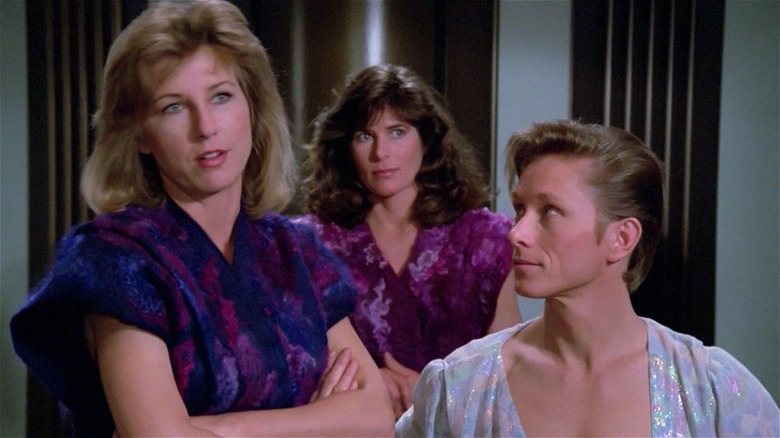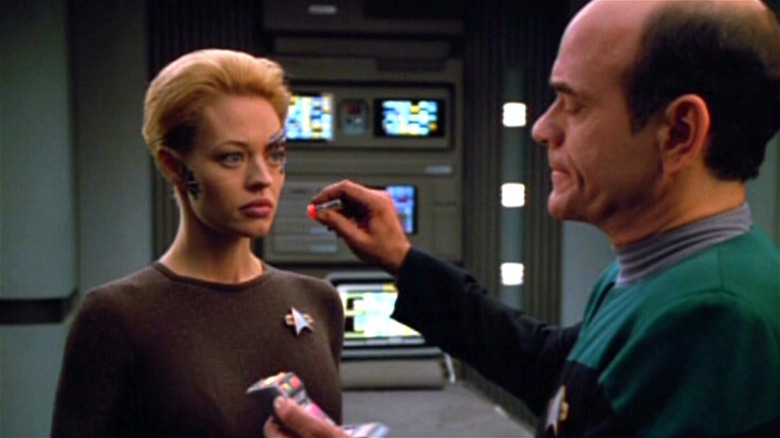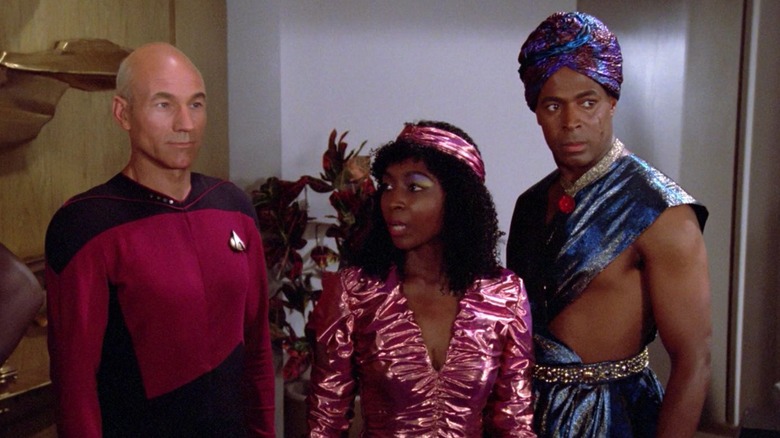5 Star Trek Storylines That Have Aged Terribly
When "Star Trek: The Original Series" ("TOS") premiered in 1966, it's hard to imagine anyone could have predicted how far its cultural impact would resonate. A progressive futurist vision of a post-scarcity human race committed to space exploration and utopian ideals, the sci-fi drama would birth a long-running franchise, with 10 animated and live-action prequel and sequel series, and more than a dozen films. While it might look like a lamé-swaddled space fantasy to Trek muggles, "Star Trek" (usually) has more than enough substance to rank it among the most cerebral of sci-fi shows.
Like all good science fiction, the "Trek" franchise often serves as an allegorical venue for exploring complex socio-political ideas, incisively tackling cultural flashpoints, from race relations to bodily autonomy and consent. While it's often surprising to see how well many of the show's decades-old hot takes still stack up today, not every episode still passes the smell test. As the franchise has weathered a few generations of changing TV show executives and shifting cultural norms, it makes sense that some episodes of "Star Trek" might make today's audiences cringe no matter how much they love Starfleet. Set phasers to stunned as we perform a complete systems check on five "Star Trek" franchise episodes that have not aged well.
The TOS episode Turnabout Intruder is a misogynist Freaky Friday
Not every series can end on a banger. And it doesn't take a TV critic to see that the "TOS" Season 3 episode "Turnaround Intruder," filmed mere weeks before the show got the ax, ended the series on the lowest of notes. While responding to a distress call on Camus II, Kirk encounters Dr. Janice Lester, an old flame he used to pal around with in his Starfleet days before realizing she was too needy for his gigolo sensibilities.
Despite the fact that they only spent a year together back in college, she has spent years stewing in her desire for revenge against his success as a Starfleet captain. To prove how capable and rational women can be, Lester drags her new boyfriend on a murderous revenge tour that involves using alien tech to Freaky Friday herself with Kirk. What follows is a nonsensical story arc's worth of William Shatner's unsettling take on how he thinks women act as the needy, desperate, and increasingly unhinged Lester-Kirk.
Forget the notable replacement of Uhura with the Temu version, the fact that the pacing of this episode is so bad that two characters bust out a nail file in boredom at varying points, or Shatner's random bouts of interpretative dance. Also, forget the fact that the actor playing Lester has clearly never seen a single episode of William Shatner's performance and the special effects are even more of a bad acid trip than usual. With its hysterical narrative about the dangers of women in power, "Turnabout Intruder" is an incel fever dream that reminds us how old the show is just in case the digital remastering somehow made us forget.
TOS's The Way to Eden is an ultra-camp time capsule
How well "The Way to Eden" has aged depends on who you ask. From a strictly aesthetic standpoint, however, this episode is a dinosaur. The Season 3 "TOS" episode finds the Enterprise crew pursuing the stolen cruiser Aurora into Romulan space. Just before its engines overload, causing a fiery explosion, Scotty manages to rescue a half-dozen Lisa Frank X Burning Man refugees. Among their ranks is Tongo Rad, a nepo-baby with My Little Pony hair, and Chekov's Starfleet dropout ex, Irina.
Ungrateful for the last-minute save, the colorful youths immediately stage a transporter room sit-in for no apparent reason while bombarding poor Spock with an incessant spate of obnoxious slang, including, "Oh Herbert, you are a stiff!" When an older leader emerges to demand their transport to a quasi-mythical planet Eden, it's clear their vibe is more Jonestown than Bonnaroo.
Viewed in the 21st century, it's hard to fully grasp the episode's take on the zeitgeist of 1969. By today's standards, the narrative structure is so giddy and unmoored that it's hard to tell if the musical number in the medbay is a high point or a low point. There's a lesson in here, nonetheless — the beautifully campy episode could be used as an empathy training tool since it does a fairly decent job of demonstrating how freakish and alien young progressives look to aging conservatives.
TNG's Angel One is a sloppy gender study
"Angel One" is one of the franchise's more painful attempts at gender studies — and it only gets more painful with each passing year. One of the thirstier episodes in "Star Trek: The Next Generation," ("TNG") the episode is also a case study of just how low Riker is willing to drop his standards to pull off the other Riker maneuver. In search of survivors from a freighter accident, the Enterprise visits a matriarchal planet governed by a constitutional oligarchy of six mistresses only to get a rather icy reception.
It's a role-reversed version of the real world where men are all compliant, stammering twinks dressed like Zoolander Ken dolls. Regarding the persecution flip, Picard exposits, "The female is aggressively dominant as the male gender was on Earth hundreds of years ago. Here, the female is the hunter, the soldier, larger and stronger than the male, an arrangement considered most sensible and natural." With a Romulan threat looming and the Enterprise under siege from a gnarly case of space-covid so bad it has Picard in his jammies, Troi and Riker work to save the survivors from execution for promoting equal rights.
While the episode was well-intended, its flawed take on gender relations is amplified when seen through a 21st-century lens. Perhaps it's the fact that Riker is just a little too eager to roleplay as an Angel One boy toy for a little space action. Either way, it's reassuring to see Angel One downgraded to a galactic pub crawl zone in "Lower Decks" ("Empathological Fallacies").
Voyager's Retrospect reads like an anti-#metoo hatchet job
For many "Star Trek" fans, "Voyager" ("VOY") represents some of the best storytelling in the series. Sure, there are problems — consider salamander Tom Paris in "Threshold" as an example. Still, the show often serves as a forum for nuanced analysis and critique of Starfleet's ethics, often through the perspective of strong female characters like Captain Kathryn Janeway, B'Elanna Torres, and Seven of Nine. Sadly, the richness of those stories will always be underpinned by accusations of on-set misogyny and mistreatment from the lead actors who brought them to life.
Suppose ever there was any doubt about how deep that misogyny ran. In that case, the "VOY" episode "Retrospect" is here to put it to rest. Even without a deeper understanding of the story behind the story, it's still pretty shocking by today's standards.
Before the drama begins, the episode finds the women of "Voyager" mentally and emotionally drained from their dealings with an abrasive trader named Kovin. After spending two hours alone with him, Seven begins experiencing PTSD symptoms, and memory retrieval therapy with the Doctor leads Seven to claim that Kovin assaulted and abused her. She's forced to support her claim with evidence. The evidence that's uncovered points to Kovin's innocence, leaving the truth unclear by the end of the episode. In the post-metoo era, it looks a lot like it's suggesting that harassment accusers should not be believed. As "Trek" writer Bryan Fuller told the Trekspert podcast, the episode is a little creepy when viewed from the present day in light of the show's on-set abuses.
TNG's Code of Honor is an embarassment to its cast
In the running for cringiest "TNG" episodes by today's standards is the Season 1 episode "Code of Honor," which sees Tasha Yar pitted against another woman in the franchise's thirstiest catfight since Spock and Kirk's Vulcan cagematch. The "Star Trek" franchise has an affinity for shiny, holographic fabrics and that is on full display as the crew initiates diplomatic relations with Ligon II in hopes of acquiring a vaccine. They run into some culture shock over the Ligonian gender constructs in which women own the land while men rule them. Things turn from awkward to bad when their leader, Lutan, is more interested in learning about Starfleet's hot security babes than Picard's ancient earth tchotchkes and decides to abduct Tasha Yar. The whole mess ends in a prize fight to the death between Yar and his wife.
Watching "Code of Honor" today is like taking a crash course in cancel culture don'ts. There's an uneasy subtext to the fact that the entire Ligonian race was portrayed by Black actors, particularly given the undertones of the story. Factor in the episode's generous appropriation of non-white cultures that are often exoticized, othered, and deemed primitive in American media — tribal sub-Saharan African, ancient China's Ming Dynasty, and Native American in particular — and it gets even cringier.
